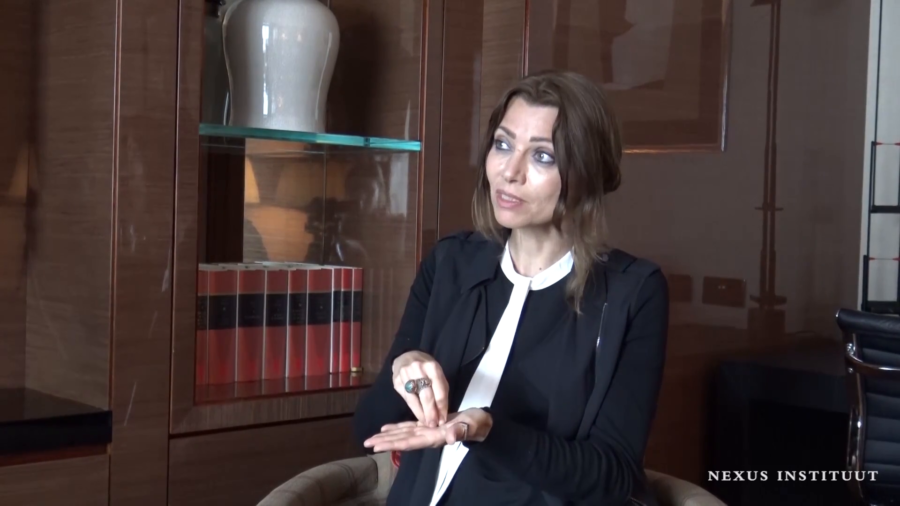Rob Riemen: If we look at our first big question, “What’s the defect of our civilization?” which is a quote from Freud, from a philosophical perspective, or theological perspective, religious people will argue, “Well, there’s a thing called original sin.” There’s also a more enlightened or [inaudible] perspective which will assume human nature. What is it that you would argue, concerning us human beings, that we apparently do not learn the lessons, or that we can turn back into the more dark zone of human life?
Elif Şafak: Well, we do have certain dualities in front of us that will become very important in the next decades. How do we deal with identity, identity politics, differences? Unfortunately in today’s world, because there’s so much fear, there’s so much anxiety— And I’m not belittling anxiety, I’m an anxious person myself; how can I belittle other peoples’ anxieties? But anxiety’s something we need to talk about. And when politics is guided by anxiety, or fear, that’s very dangerous.
So one of the primary questions, or problems as I see it, is this “illusion” that sameness will bring safety. People start to thinking that if we are surrounded by similar people, like-minded people, if we have communities based on sameness, that will bring us safety. That’s an illusion. That’s not the case at all. We are far too globalized. So what is happening in one part of the world affects someone in a completely different part of the world. The unhappiness of one individual in Pakistan affects the life of someone in Canada. This is the world we’re living in. So we do have to understand that we’re all in this together as global souls, as world citizens, and we need to revive the energy of humanism and coexistence.
How can we live together with our differences around shared, common values? For me, one of the main common values, one of them, is definitely democracy. And definitely women’s rights. Because how can you have harmony and peace when half of the world is being pushed back into the private space? I see this everywhere in the Middle East. In Turkey as well, but all around the Middle East, particularly. More and more women are being reminded of their roles as mothers, caretakers. More and more women are being pushed from the public space into the private space, into their homes. And there’s a huge imbalance, you know? All the mystics throughout the centuries have talked about the importance of balance. We have to balance energies. At the moment, I think the balance between masculine energy and feminine energy is completely broken in many parts of the world. That too is a problem for me.
Riemen: But isn’t also part of this that— I’m very glad that you bring up the mystics. They are unknown in our day’s world, and the people who speak most likely are intellectuals, who are confusing people’s minds concerning sameness and the revival of nationalism. In London, you have Mr. Boris Johnson. You can make a long list of highly-educated intellectuals who…are liars. It’s the phenomenon of the betrayal of the intellectuals. How to deal with that? Where does the responsibility of intellectuals come in our society, where they are not accepting their responsibility, worse when they are deceiving people?
Şafak: I think we need to differentiate two things. We can criticize the intelligentsia, the literati, and that’s fair enough, but at the same time have a lot of respect for the intellect, and try to cultivate that. And this is what I see lacking. We don’t have enough intellectual platforms, where we see people from completely different backgrounds, different cultural, ethnic, backgrounds but also different disciplines, come together, listen to each other. We have been far too compartmentalized. And I see that as a problem because we have things to learn from each other. And I think the world right now needs more interdisciplinary dialogues, you know?
So I do have a lot of respect for the intellect, and for the role of the intellectual, which is one of the interesting dilemmas for me because in the UK the word intellectual doesn’t have very positive connotations, as you know. But I think it’s important to comment on what’s happening in the world. It means that we care about it. And we need critical minds. Societies can only move forward through critical minds.
However, we should also bear in mind that there’s an amazing bulk of literature about neuroscience, the brain— We have defined the intellect in only one particular way. That also needs to change. There are different kinds of intellect. There’s emotional intelligence as well, which we need to put into the picture. And you can only cultivate that through stories, storytelling, empathy, you know, the ability to put yourself in the shoes of another person. That also needs to be in these intellectual platforms. So intellectual doesn’t necessarily mean one particular way of looking at things through logic and reason. It can be done in very different ways.
Intuition is also very important. I think we have a lot to learn from ancient philosophy. We have a lot to learn from each other. Our reading lists need to be eclectic. We need to read from the East and the West, from people who are different than us. And only that diversity is going to hopefully give us a new boost and a new energy to move forward.
Further Reference
Nexus Conference 2016, “What Will Save the World?”
